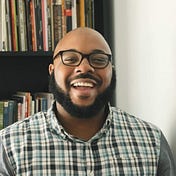
Uncut Slang
Thoughts, recommendations, and ramblings from a Spades Champion who moonlights as a poet.
By subscribing, I agree to Substack’s Terms of Use and acknowledge its Information Collection Notice and Privacy Policy

Thoughts, recommendations, and ramblings from a Spades Champion who moonlights as a poet.